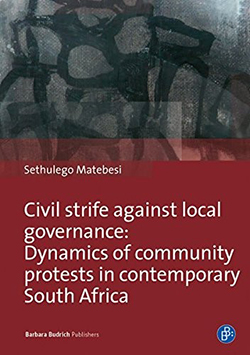Latest News Archive
Please select Category, Year, and then Month to display items
17 June 2020
|
Story Dr WP Wahl

The Division of Student Affairs (DSA) prioritises innovation to meet the challenges of food insecurity and malnutrition among students. To this end, several student volunteers and student governance structures are collaborating with the DSA on various initiatives.
During 2019, various conversations were held about the possibility of creating a health-promoting food environment at the UFS where students and staff are well informed and empowered to take appropriate action regarding their food and nutritional needs. These conversations resulted in an institutional strategy to address the food environment at the UFS. Student representatives serve on a technical committee that directs the implementation of this strategy. In this regard, several initiatives have already been launched.
Students from residences and other student communities have planted vegetable gardens on the Bloemfontein Campus with the assistance of KovsieACT and the Faculty of Natural and Agricultural Sciences. Students and staff are already harvesting and distributing vegetables to needy students every week. Measurements were put in place to continue this during the COVID-19 period. The following vegetables were planted: spinach, cabbage, beetroot, broccoli, cauliflower, and carrots.
Food parcels, donated by Tiger Brands and Gift of the Givers, are continuously handed out by DSA staff and student volunteers. In this regard, 540 food parcels have already been handed out on the Bloemfontein Campus during the COVID-19 period alone. During the same time, 117 students received food parcels on the Qwaqwa Campus. The innovation of this food parcel project rests on the fact that business, NPOs, UFS students, and DSA staff are collaborating to address food insecurity and malnutrition.
More collaborative initiatives will be implemented over the next 12 months. The DSA staff and students are already working with the Department of Dietetics and Consumer Sciences to create information packages about the preparation of low-budget nutritious meals.
Related article:
Vegetable tunnels established to continue the fight against food insecurity
Valour inspires book on community protests
2016-10-18

The cover of Dr Sethulego Matebesi’s
book, Civil strife against local governance:
Dynamics of community protests in
contemporary South Africa, that will be
released on 1 November 2016.
Photo: Supplied
Two significant political events: the murder of an unarmed protester, and school children forced out of school sparked the idea to write a book on community protests.
The book, Civil strife against local governance: Dynamics of community protests in contemporary South Africa, by Dr Sethulego Matebesi, gives an academic account of service delivery protests in South Africa.
Research address protests in different communities
“The focus of my book is on community protests directed against municipalities in both predominantly black and white communities,” Dr Matebesi, senior lecturer in the Department of Sociology at the University of the Free State, said. The funding for the book was received from the National Research Foundation and the Erasmus Mundus EU-Saturn Scholarship.
Informs literature on service delivery protests
The struggle against municipalities reaches across geographic and demographic boundaries, but the violent turn of protests in black communities in contrast to white communities has become somewhat of a hegemonic account by scholars. “The book connects the critical issue of community protests with the equally precarious issue of political trust in local government,” Dr Matebesi said. Case studies in the book are indicative of significant shifts in community protest – thus making it timely. Dr Matebesi said: “The book informs the growing literature on community protests and also fills an empirical void by including protesters in residents’ associations.”
“The book is a personal milestone and
the single greatest return on the
sacrifices made over the past 4 years.”
Personal milestone worth the sacrifice
Research was conducted between 2012 and 2015, whereby two case study sites were selected in four provinces to account the different tactics used. “The book is a personal milestone and the single greatest return on the sacrifices made over the past four years,” Dr Matebesi said.